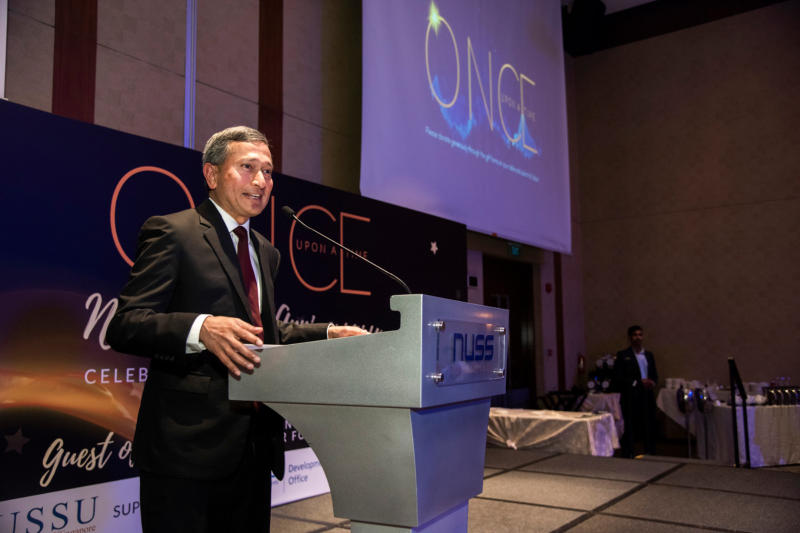Bursaries set up by universities help ensure equal educational opportunities for young: Vivian Balakrishnan
Sign up now: Get ST's newsletters delivered to your inbox

Minister for Foreign Affairs Vivian Balakrishnan at a fund-raiser held by the National University of Singapore Students' Union on Aug 23, 2019.
PHOTO: NATIONAL UNIVERSITY OF SINGAPORE STUDENT UNION
Follow topic:
SINGAPORE - It is important to ensure that young Singaporeans have all the opportunities to get a tertiary education even if they are poor, and this is why bursaries set up by universities here are important, said Minister for Foreign Affairs Vivian Balakrishnan on Friday (Aug 23).
To this end, the Government began putting in place policies from 20 years ago to make sure middle-income Singaporeans and those who are less well-off do not feel a university education is out of reach because they cannot afford the fees.
Earlier this week, Prime Minister Lee Hsien Loong said at the National Day Rally that the Government will lower tertiary education fees and give out bigger bursaries.
But society too has a part to play, said Dr Balakrishnan at a fund-raiser held by the National University of Singapore Students' Union (Nussu), as he urged alumni to give generously to Nussu and the Nussu Alumni Bursary Fund (Endowed).
Dr Balakrishnan, who was president of the students' union council in his undergraduate days, was the guest of honour at the dinner, which raised $113,588.80 for the fund.
Quoting PM Lee's Rally speech, he said subsidies and bursaries given by the Government will not be as personal as bursaries that come from private donors.
"Not only the Government but society and the alumni at large will ensure that educational opportunities will always be open for all," he added.
Dr Balakrishnan made the point as he spoke on how young Singaporeans believe there should be equal opportunities for all.
This is one of three attributes that make them different from their peers elsewhere, he said. The other two are a strong sense of national identity and having a real stake in Singapore's future.
Dr Balakrishnan said that though young people sometimes disagree on issues, each and every one of them instinctively feels Singaporean and shares a "sense of collective destiny and sense of being masters of our own future".
With the Government having built a "stake-holding society", such as through the HDB scheme that has ensured high rates of home ownership, young people here also recognise they have a stake in Singapore's success and progress, he added.
"But going beyond bricks and mortar is this sense that we're in it together and that if we take liberties with our own future, we have real stakes to lose," he said when elaborating on how young Singaporeans differ from those elsewhere.
"Without naming names, this question has become even more salient in recent times," he added.
Young people here have been compared by some commentators to those in Hong Kong, who are the force driving the pro-democracy demonstrations that have roiled the territory for three months.
At the dinner, Dr Balakrishnan also touched on the history of NUS.
Its predecessor, the University of Malaya, was formed when the King Edward VII College of Medicine and Raffles College merged.
Both the medical school and NUS were set up in part to give Singaporeans an equal opportunity in education because the British, as Singapore's colonial masters, had treated locals as second class, he said .
And as Singapore marks its bicentennial this year, it is important to know the history and context of developments here, he added.

